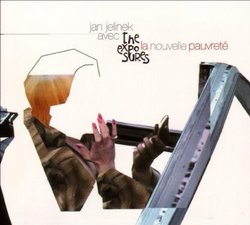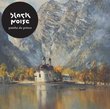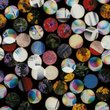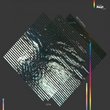| All Artists: Jan Jelinek, Exposures Title: Nouvelle Pauvrete Members Wishing: 2 Total Copies: 0 Label: Scape Germany Release Date: 2/10/2003 Genres: Dance & Electronic, Pop Styles: Electronica, IDM, Dance Pop Number of Discs: 1 SwapaCD Credits: 1 |
Search - Jan Jelinek, Exposures :: Nouvelle Pauvrete
 | Jan Jelinek, Exposures Nouvelle Pauvrete Genres: Dance & Electronic, Pop
|
Larger Image |
CD DetailsSimilar CDs
|
CD ReviewsJunkmedia Review- A bit of a disappointment junkmedia | Los Angeles, CA | 02/19/2003 (2 out of 5 stars) "The ~scape label is one of Germany's prize performers in the world of contemporary dub. Releases like Kit Clayton's Nek Salanet, Burnt Friedman & the Nu Dub Players' Just Landed, the unpronounceable Staedtizism compilation series and all of label-founder Pole's records have explored new applications for the classic ingredients developed and dilated in Jamaica. You've caught Jelinek in the act before: he records as Farben on Klang Electronic to much acclaim, has an album on Source Records under the name Gramm, and released the album Loop-Finding-Jazz-Records in 2001 on ~scape. Unlike Farben's minimal house groove, Loop-Finding channeled the tempting waters of swing rhythms and raspy old 45s while retaining the sub-bass of classic dub. I had high hopes for Jelinek's new offering, whose title reads as "new poverty" in English translation (or perhaps less literally, "the new poor," an inversion of "nouveaux riches"). A French vibe of poverty, baguettes, seedy nightlife, and desperate actions. Then I put on the CD. Poof. Gone were my Francophile leanings, replaced by a promising first couple of songs -- "Music to Interrogate By" could sit comfortably next to Jelinek's Farben output. Things seem to be fine. And then we get into the meat of the album, which is chiefly concerned with lounge melodies and finger-snapping coolness, occasionally emphatic enough for a dancefloor ("My Favourite Shop" and "If's, And's, and But's" [sic]), but usually in the contemplative/chill-out vein ("There Are Other Worlds [They Have Not Told You Of]" and "Trust the Words of Stevie"). On these latter two tracks, a mysterious, somewhat unintelligible voice accompanies the narcotic-tinged music. This must be the contribution of the "Exposures." Reminiscent of a previous ~scape release by Burnt Friedman, Jelinek has enlisted the help of a mysterious supporting cast to help him maneuver this terrain. The press release states "...The Exposures act as his fictitious backing band, Jan Jelinek's Alter Ego and extended self, bolstered by the new, carefully introduced rock references." Ok, sure, but -- rock references? The album's melodic and rhythmic structures are far more indebted to mid-20th century American jazz and swing than anything else, much less rock. Perhaps this is a translation issue, or simply the label reps trying to weave meaning out of thin air. In any event, rock fans take note: it's unlikely you'll find anything to gnaw on here. What you will find is Jelinek's characteristic knack for savvy production techniques and sounds, thrown into a stale "sipping martinis in the afternoon shade" vibe. We're not in the same territory as Loop-Finding, which is good and bad. While Loop-Finding was a thick and dusty testament to groove, "La Nouvelle Pauvreté" is much more concerned with a Jimi Tenor-esque coolness -- think Las Vegas smoke-filled halls at 4:45 AM. I hate it when sounds are subjugated to inessential attitude, especially when that attitude isn't inviting in the least. Ultimately, the majority of this album fails to keep my attention and is an unfortunate misstep from a nonetheless competent and interesting producer. Ben Gill February 10, 2003 Junkmedia Review" Elevators of the Future M. Starr | Kansas City | 11/01/2003 (4 out of 5 stars) "Jan Jelinek's new album, Le Nouvelle Pauvreté, is not unlike partaking in the orgy scene from the movie "Eyes Wide Shut." The opening track insinuates the sound of an all-glass elevator whisking you up 250 floors to a secret, and elitist, new nightclub strictly for your aural pleasure. Once the doors open, you begin slowly walking around a room full of people who have no idea who you are, yet everyone in the room is completely intrigued by what is taking place around them. There's sort of a silent grace that begins to tug at your coat tail, and this is a night your soon not to forget. The DJ, who just happens to be Jan Jelinek, is playing Le Nouvelle Pauvreté, his new album. It's less spacious and glitch-y than its older brother, Loop-Finding-Jazz-Records, but who are you to care? The overall vibe of La Nouvelle Pauvreté sounds more like Jelinek's Farben experiments, which focuses more on the idea of getting his listeners on the dance floor than on a train with a pair of headphones. However, the high level of perfection has not been eliminated from Jan's formula. The main thing, though, that sets this album apart from Loop-Finding-Jazz-Records is the lack of involvement with record static and spaciousness. The beats are more at the forefront of the process, and there are even lyrics present by yet another of Jelinek's apparent aliases, Avec the Exposures. While glitch music is becoming incessantly harder to individualize, Jelinek proves that he is still a very forward-thinking composer who always opts for the side door out. La Nouvelle Pauvreté is no exception to this rule. Fans of his work will be pleasantly surprised by this new outing by Germany's premier glitch artist." Clickhouse moves from theory to comfortable practice Phil Avetxori | 03/19/2003 (5 out of 5 stars) "Electronic music in 2003 isn't quite the realm of wide-eyed discovery that once seemed part of its very nature. After the dawn of the techno era in the late eighties, its evolution seemed less a matter of paradigm shifts than a constantly unfolding internal imperative. Despite this tendency in electronic music toward constant, critically ungraspable change over sudden stylistic leaps, some notable artists did send it spinning off into hitherto unforeseen directions. Autechre comes immediately to mind, with that group's prismatically skeletal aesthetic informing much of "IDM" to this very day. Another unambiguously groundbreaking artist was Oval, whose cd-skip samples and use of digital errors signalled the dawn of the Glitch. Several years after Oval's emergence, the glitch, the click, the cut, the pop, and the skip are a constant presence in the landscape of contemporary music. Understandably, many have grown weary of the way these sounds and techniques have com to dominate electronic music over the last three years or so. By my reckoning, however, this aesthetic has simply been absorbed into the stylistic toolchest; at hand for today's electronic musician along with synthesis, sampling, dub techniques, dancefloor mechanics, etc. The artist possibly most at ease with clicks/glitches as intuitive tools is Jan Jelinek. Recording as Farben, Gramm, and under his own name, Jelinek has a knack for making minimal electronic music with both an unmistakable personal signature and a sense of moody warmth. On 2001's acclaimed "Loop-Finding-Jazz-Records", rolling washes of muffled clicks rhythmically washed over atmospheric, jazzy melodies, while dub bass rumbles and unobtrusive house beats held down the bottom end. "Nouvelle Pauvrete" combines this approach with the more overtly funky skippety rhythms of his Farben works to create an assured set of hazy late-night grooves with just a touch of lounge quirk. "Facelift", with it's multi-pitch, slurred narration has a mysterious, shadowy vibe. It's quietness almost obscures the incredibly funky bounce of it's fluid rhythms, while detuned horn samples wheeze through the murk. "If's, And's, and But's" is another standout, where Jelinek indulges his love of sweeping disco strings (previously most evident on some Farben tracks) to a degree he's never before dared, while demonstrating his improved ability to smoothly work his samples into his tight rhythmic matrices. The rest of the cd deals in greater and lesser degrees with sampled loops and more microscopic abstraction, but all within an understated, tastefully minimal contextWith glitchmania beginning to subside, electronic music has entered a period where quality and feel will win out over mere novelty. Jan Jelinek, at home in the altered sonic landscape of the post-glitch era, continues to quietly prove himself a major creative force."
|

 Track Listings (9) - Disc #1
Track Listings (9) - Disc #1


